
Events in Motion: Unlocking the Future of Global and Regional Event Logistics
As global demand for large-scale and hybrid events rises, event logistics has become a strategic necessity. From transportation and equipment handling to real-time tracking and sustainability, logistics now plays a critical role in delivering seamless and impactful experiences. This whitepaper explores key market trends, innovations, and regional insights shaping the future of event logistics, with a special focus on global and GCC markets.
Global Event Logistics Market Overview
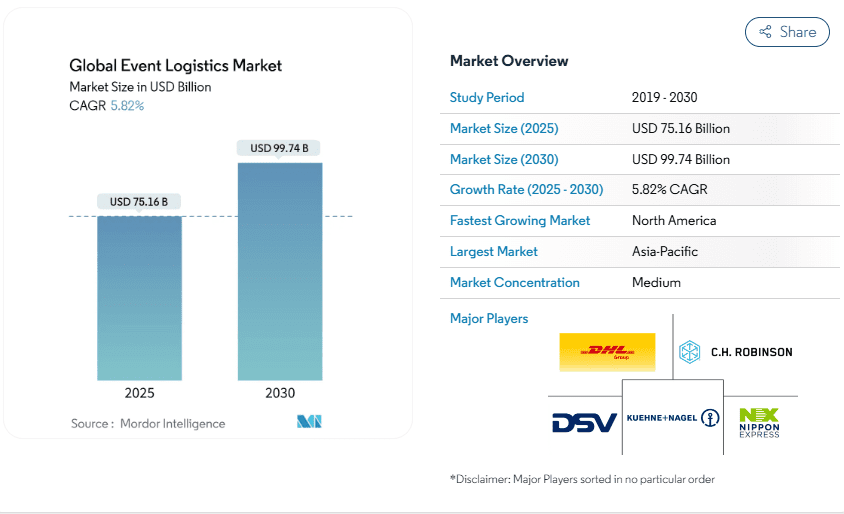
The Global Event Logistics Market is poised for significant growth, with projections estimating its value at USD 75.16 billion in 2025 and reaching USD 99.74 billion by 2030, reflecting a compound annual growth rate (CAGR) of 5.82% during the forecast period.
Key Growth Drivers
Several factors are contributing to this upward trajectory:
- Resurgence of Mega-Events and Hybrid Formats: The return of large-scale events and the normalization of hybrid formats is driving demand for comprehensive logistics solutions.
- Shift Towards Single-Provider Outsourcing: Organizations are increasingly opting for single-provider logistics solutions to minimize coordination risks and streamline operations.
- Technological Advancements: Investments in IoT-enabled tracking and AI-driven planning enhance shipment visibility and operational efficiency.
- Infrastructure Modernization in Asia-Pacific: Upgrades in infrastructure are reshaping routing patterns, making the region a pivotal player in the global logistics landscape.
Market Segmentation Insights
- By Service: Transportation services dominated the market with a 78% revenue share in 2024. Warehousing, distribution, and inventory management services are projected to grow at a 7% CAGR through 2030.
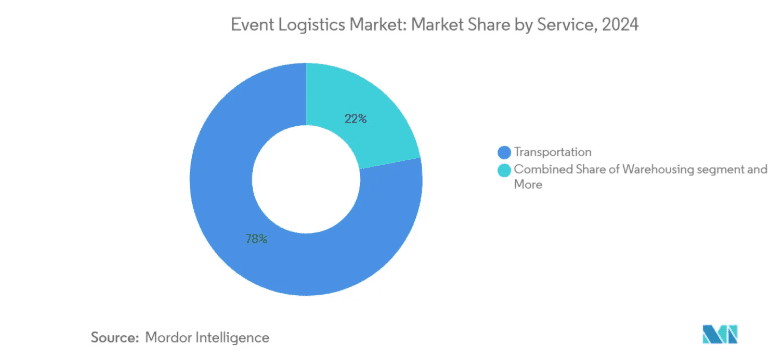
- By Application: The entertainment and media sector accounted for 42% of the market share in 2024. Sports events are anticipated to grow at a 6.8% CAGR through 2030.
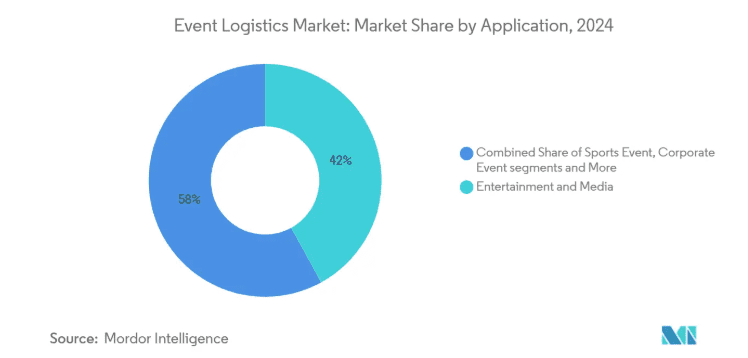
- By Geography: North America led the market with a 38.1% share in 2024. However, the Asia-Pacific region is expected to experience the fastest growth, with a projected CAGR of 7.2% between 2025 and 2030.
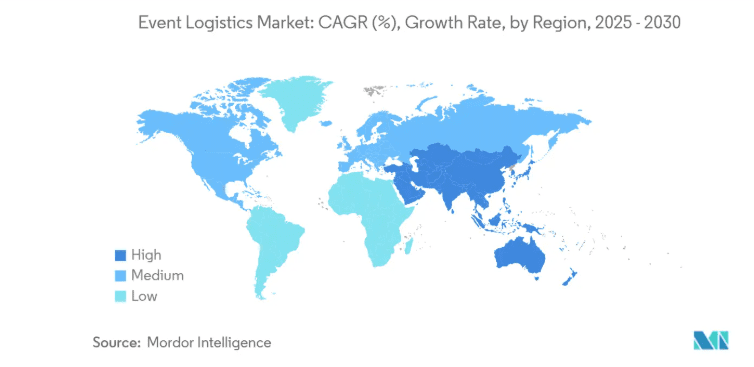
Leading Market Players
Prominent companies shaping the global event logistics market include DHL Supply Chain & Global Forwarding, Nippon Express, C.H. Robinson Worldwide, Kuehne + Nagel International AG, and DSV A/S.
These organizations are leveraging technological innovations and strategic partnerships to enhance service offerings and expand their global footprint.
In summary, the global event logistics market is experiencing robust growth, driven by the resurgence of large-scale events, technological advancements, and strategic shifts in service delivery models. The Asia-Pacific region, in particular, is emerging as a significant contributor to this growth, underscoring the dynamic nature of the global logistics landscape.
GCC Event Logistics Market Overview
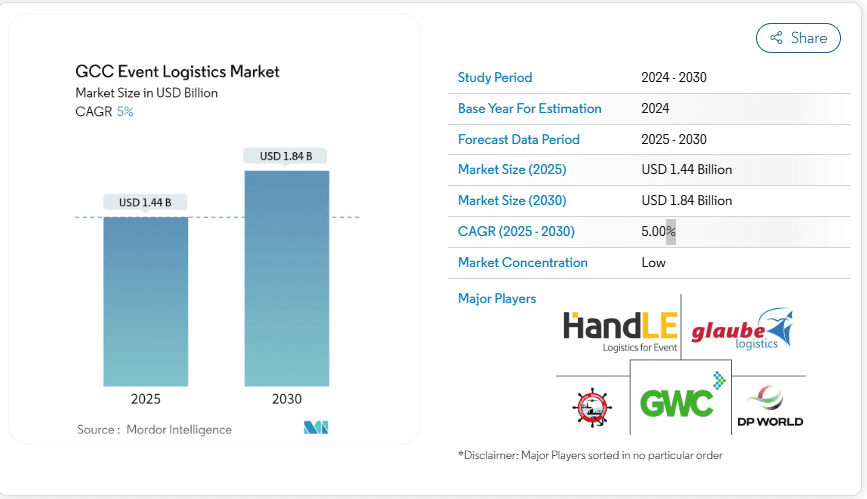
The Gulf Cooperation Council (GCC) Event Logistics Market is experiencing robust growth, with projections estimating its value at USD 1.44 billion in 2025 and reaching USD 1.84 billion by 2030, reflecting a compound annual growth rate (CAGR) of 5% during the forecast period.
Key Growth Drivers
Several factors are contributing to this upward trajectory:
- Hosting of Mega Events: The successful execution of large-scale events such as Expo 2020 in Dubai and the FIFA World Cup 2022 in Qatar has positioned the GCC as a premier destination for international events, necessitating sophisticated logistics solutions.
- Strategic Investments in Infrastructure: Governments across the GCC are investing heavily in logistics infrastructure. For instance, Saudi Arabia’s Vision 2030 includes the development of 59 logistics centers, aiming to enhance the Kingdom’s position as a global logistics hub.
- Diversification of the Economy: Efforts to diversify economies beyond oil have led to increased focus on sectors like tourism and entertainment, further driving demand for event logistics services.
Market Segmentation Insights
- By Type: The market is segmented into inventory control, distribution systems, and logistics solutions, catering to the diverse needs of events ranging from entertainment to trade fairs.
- By Application: Applications span across entertainment, sports, trade fairs, and other events, each requiring tailored logistics support to ensure seamless execution.
- By Country: Saudi Arabia and the United Arab Emirates are leading markets within the GCC, driven by their ambitious event hosting agendas and substantial investments in logistics infrastructure.
Leading Market Players
Prominent companies shaping the GCC event logistics landscape include GWC Logistics, DP World, Handle Logistics, Glaube Logistics, and CSS Group. These organizations are leveraging technological advancements and strategic partnerships to enhance service offerings and expand their regional footprint.
In summary, the GCC Event Logistics Market is on a growth trajectory, fueled by the region’s commitment to hosting world-class events, strategic infrastructure investments, and economic diversification efforts. These factors collectively position the GCC as a burgeoning hub for event logistics in the coming years.
Key Geographic Markets in Event Logistics
The event logistics market is highly influenced by regional dynamics, with key markets across North America, Europe, Asia-Pacific, and LAMEA (Latin America, Middle East, and Africa). Each of these regions plays a significant role in the global growth of event logistics.
Europe: A Hub for Major Global Events
Europe continues to be a leader in hosting international events, driven by its well-developed infrastructure, rich cultural history, and proximity to key markets. Countries like Germany, France, and the UK remain central to the global event logistics industry.
- Global Event Centers: Cities like Berlin, Düsseldorf, and London are home to some of the most important global events, from the IFA Consumer Electronics Expo to major corporate conferences and trade shows.
- Government Support for Events: The European region has long recognized the importance of the events industry to its economy, and countries like Germany and the UK continue to invest in infrastructure and logistics to ensure the smooth execution of large-scale events.
Asia-Pacific: Rapid Growth and Technological Adoption
Asia-Pacific is one of the fastest-growing regions for event logistics, driven by a rapidly expanding middle class, a growing interest in international events, and significant investment in event infrastructure.
- Increased Sports and Entertainment Events: Countries like China and India have seen an increase in the number of international sports leagues, concerts, and exhibitions. This trend has led to higher demand for advanced logistics services to manage the transportation and delivery of goods and materials for these events.
- Technological Advancements: The adoption of technology in Asia-Pacific is accelerating, with event logistics companies increasingly relying on digital tools to streamline operations and manage large-scale events.
North America: A Mature Market with Strong Corporate Demand
North America, particularly the United States, remains one of the largest markets for event logistics, driven by the demand for corporate events, exhibitions, and trade shows.
- Corporate and Entertainment Events: Major cities like New York, Las Vegas, and Los Angeles are key locations for corporate events, product launches, and entertainment gatherings, which require extensive logistical coordination and planning.
- Technological Integration: North America is at the forefront of integrating advanced technologies such as AI, IoT, and RFID into event logistics operations, enabling more efficient management of complex logistics chains.
The Evolving Landscape of Event Logistics
The events and entertainment industry is undergoing a significant transformation, driven by technological advancements, sustainability imperatives, and evolving attendee expectations. Event logistics, encompassing the planning, coordination, and execution of all logistical aspects, has become a critical component in ensuring the success of events. From transportation and equipment handling to accommodations and on-site management, effective logistics are vital for seamless operations.
Technological Advancements in Event Logistics
Artificial Intelligence and Predictive Analytics
Artificial Intelligence (AI) is revolutionizing event logistics by enabling predictive analytics for traffic patterns, resource allocation, and attendee behavior. AI-driven software allows planners to anticipate potential challenges, such as traffic delays or disruptions, facilitating proactive adjustments to schedules.
Internet of Things (IoT) and Real-Time Tracking
The integration of IoT devices provides real-time monitoring of assets and inventory, ensuring timely delivery and setup of event materials. IoT sensors track materials in real time, enhancing operational efficiency and reducing errors.
Virtual and Augmented Reality
Virtual Reality (VR) and Augmented Reality (AR) are being utilized to enrich attendees’ experiences and facilitate planning. These technologies offer immersive experiences, virtual tours, and interactive demonstrations, enhancing engagement and providing innovative solutions for event logistics.
Sustainability and Green Logistics
Sustainability has become a central focus in event logistics, with organizers adopting eco-friendly practices to reduce environmental impact. Strategies include using electric vehicles, optimizing delivery routes to reduce fuel consumption, implementing biodegradable packaging, and adopting zero-waste and carbon-neutral initiatives.
Hybrid and Virtual Event Logistics
The rise of hybrid and virtual events has introduced new logistical considerations. Organizers must manage both physical and digital components, ensuring seamless integration of technology, effective audience engagement, and reliable infrastructure to support virtual participation.
Enhancing Attendee Experience through Logistics
Logistics plays a pivotal role in enhancing the attendee experience. Personalized transportation options, efficient crowd management, clear signage, and streamlined check-in processes contribute to attendee satisfaction. Utilizing data analytics and AI, organizers can tailor event journeys, creating immersive experiences and fostering emotional engagement through storytelling.
Risk Management and Contingency Planning
Effective risk management is essential in event logistics. This involves conducting comprehensive risk assessments, developing contingency plans for potential disruptions, and ensuring compliance with safety regulations. Collaborating with local authorities and implementing robust communication strategies are also critical components of risk mitigation.
Collaboration and Cross-Industry Partnerships
The complexity of modern events necessitates collaboration across various sectors. Event organizers are partnering with transportation companies, tech providers, hospitality services, and security firms to ensure seamless operations. These partnerships facilitate the integration of cutting-edge tools and technologies, enhancing efficiency and effectiveness.
Future Trends and Innovations
Looking ahead, several trends are poised to shape the future of event logistics:
- AI-Powered Scheduling: Artificial intelligence will further optimize transportation and event setup schedules.
- Sustainable Event Logistics: Green energy solutions and eco-friendly transport will reduce the carbon footprint of large events.
- Drones for Surveillance and Delivery: Drones will be used for security monitoring and quick equipment delivery.
- Smart Ticketing Systems: Advanced ticketing solutions will improve entry logistics and crowd management.
- Augmented Reality for Planning: AR technology will allow event planners to simulate logistics in advance.
Conclusion
Event logistics is evolving into a tech-driven, sustainability-focused function that underpins the success of modern events. By embracing emerging technologies, fostering cross-industry partnerships, and adapting to regional needs, businesses can ensure their events run efficiently and leave lasting impressions. The future of event logistics is agile, intelligent, and essential.
Related Articles
Events in Motion: Unlocking the Future of Global and Regional Event Logistics
As global demand for large-scale and hybrid events rises, event logistics has become a strategic nec
Retail Logistics in the Age of E-commerce and Innovation in the UAE
Retail logistics is the backbone of e-commerce success, driving fast and efficient delivery. As cons
Future of FMCG Logistics: Trends, Challenges, and Opportunities
Discover the latest insights and strategies driving the FMCG logistics market. This comprehensive wh






Post a comment
You must be logged in to post a comment.